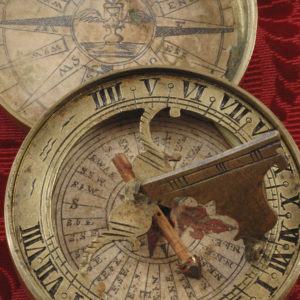Welcome to the Newell D. Goff Center for Education and Public Programs. To present and interpret Rhode Island’s past to the public, the Goff Center sponsors tours and programs at the John Brown House Museum, the Aldrich House, the Museum of Work & Culture, and the Mary Elizabeth Robinson Research Center. In addition, we create educational materials to be used by students and teachers and provide professional development opportunities for our state’s and the nation’s teachers, thanks to the federal Teaching American History (TAH) grant program, and funding from the National Endowment for the Humanities, the National Park Service, the Rhode Island Council for the Humanities, and the John H. Chafee Blackstone River Valley National Heritage Corridor Commission and other sources. We are also generously supported by the private donations of members and supporters like you.
Here are some of the current Goff Center initiatives:

EnCompass: A Digital Archive of Rhode Island History
The RIHS is currently developing EnCompass, a multi-media, digital archive of Rhode Island History in order to provide free access to primary- and secondary-source content that allows teachers to easily connect Rhode Island examples to broader national themes and trends. The textbook is aligned with current GSEs for Social Studies in RI, and is targeted toward Grades K-12. In order to deliver the most useful product possible to teachers, it is crucial that we engage their support and solicit feedback from the earliest stages. To this end, we have chosen the topics for the first unit based on data from a 2013 survey of Social Studies teachers conducted by RIHS and supported by the Rhode Island Council for the Humanities.
All-Abilities Programming:
The Rhode Island Historical Society is committed to making its locations accessible to visitors of all abilities. We strive to understand the needs of our communities and work to foster an inclusive environment for exploring and learning. Creating access for individuals who may be intimidated by museums or feel that their stories are not mirrored within its walls is our priority. We seek to build lasting relationships with all visitors and supporters, and endeavor to meet their needs and exceed their expectations. The Society is working on opportunities to expand accessibility for visitors who are deaf or hard of hearing, blind or visually impaired, or mobility impaired at both the John Brown House Museum in Providence and the Museum of Work & Culture in Woonsocket.
Field Trip Free-for-All and Transportation Support:
The Field Trip Free for All program offers, at no cost, teacher-supervised visits to the RIHS’s John Brown House Museum and Mary Elizabeth Robinson Research Center in Providence, as well as the Museum of Work & Culture in Woonsocket for students from preschool through higher education, as well as for homeschool families and educational organizations. The RIHS’s immersive experiences give students greater access to history in “their own backyard.” Tours can also help teachers address difficult subjects that are sometimes avoided in classrooms.
The RIHS provides a strong foundation in educational and historical literacy in a time when funding for these programs is increasingly being threatened. Regardless of financial status, history should be accessible to all, which is why the RIHS has established the Klyberg Educational Access Fund, made possible by a bequest from former director Albert T. Klyberg, who passed away in January of 2017. The fund will award grants of up to $400 to Title I-designated schools to help underwrite the cost of bus transportation to RIHS sites.
Think Like an Archaeologist:
Think Like an Archaeologist is a four classroom session program, with an additional visit to the RISD Museum at the Rhode Island School of Design, Brown University’s Haffenreffer Museum of Anthropology, or the Rhode Island Historical Society’s John Brown House Museum. The sessions introduce 6th grade Social Studies students to the whole process of archaeology, from choosing an excavation site and learning to dig, to analyzing and caring for artifacts. Each session is hands-on, led by faculty, staff, and doctoral students from Brown University and the Rhode Island School of Design. This is a partnership program between Brown University’s Joukowsky Institute for Archaeology and the Ancient World, the Haffenreffer Museum of Anthropology, the RISD Museum at the Rhode Island School of Design, and the Rhode Island Historical Society for 6th grade Social Studies students in the Providence Public Schools.
For more information about these and other Goff Center initiatives, please contact Geralyn Ducady, Director, Newell D. Goff Center for Education & Public Programs, gducady@rihs.org, (401) 331-8575 x345.
